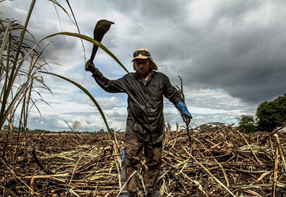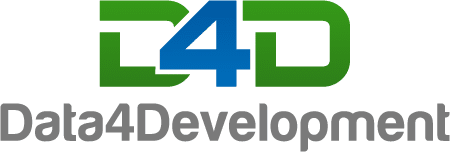When D4D joined forces with CNV Internationaal, a cooperation emerged that puts data in position to support labour rights on remote sugar plantations in Central America. A data framework was created allowing CNV Internationaal to measure and analyse workers’ responses to questions such as; are their collective agreements, do you have a permanent contract, are you receiving social security, are you entitled to regular leave, do you receive minimum wage/ living wage… That way, CNV Internationaal and their project partners, union leaders and ground-level stakeholders, can get insights directly from the data provided by the workers to guide their lobby efforts. D4D and CNV Internationaal envision that this framework and the tooling can be rolled out into other CNV Internationaal sectors in the future. This is a truly forward-looking and exciting way to use data, and therefore directly relates to our vision to be led by data-driven knowledge!
In a blog series of 3 episodes, of which this is the first, we will report our progress in this project.
Today, we dive a little deeper into the background of this project from CNV Internationaal’s perspective and what progress they have made thus far coming from an information need towards envisioning an opportunity for widespread impact.
Background story
The need for information and how to hear the voice of the workers
Sugar capers on remote sugar plantations in Central America rarely have steady jobs. They are often day laborers working for a salary that is less than the cost of living. Usually the company hires them through an employment agency. Many of them are migrants from a neighbouring country where there is less work or where wages are even lower. The extremely long working days, combined with tropical heat, not enough breaks and a shortage of drinking water in the remote fields, form a deadly cocktail for the kidneys that eventually turns fatal to many sugar capers. Anyone who dares to raise issues or join a union runs the risk of not getting a job at all. Neither with the same, nor with another plantation. Black lists of names circulate between companies.

That’s how sugar capers are mangled. Their voice is not heard. The management board classifies accidents and illness as incidents. Plantations are far away from civilisation. Then how do you prove what exactly is going on and what the working conditions are like?
But aren’t there also certified producers? And food groups in Europe that do their best to do business responsibly? Yes, but reality shows that it is difficult to exclude risks of exploitation in the value chain. The main cause; rules, certification and agreements remain paper bureaucracy if the voice of workers on the plantations about whether things are going well or wrong is not given a place. But how can we get their voices through?
By directly asking them the questions that matter: On which plantations is union freedom under pressure or how many people do not receive a living wage? CNV Internationaal calls this evidence-based lobbying.
How data helps
When negotiating with the management of the company, it is important for trade unions to be able to indicate exactly what the situation is and substantiate their claims with reliable data, leading to a much stronger position in question about proposals to improve the circumstances. For example, when discussing living wage, the predictable response from the employer side is of course: What will it cost and who is going to pay for it? Data is needed to calculate what the situation is now and what it will really cost to make a living wage part of the standard and what companies must contribute to a living wage in the sugar sector.
And, very importantly, good data makes it possible to contribute to greater transparency of the entire international value chain. As in the case of sugar; CNV Internationaal is a member of Bonsucro, the organization for making the sugar sector more sustainable. As a member, they want to contribute to the improvement of the standard that is currently under revision. Within Bonsucro, the voice of the sugar capers is hardly heard until now. Social issues are currently hardly included in the standard. Naturally, they will have to come up with well-founded arguments to convince not only the producers, but also the companies in the food sector higher up in the chain to change this and to include labour rights such as living wage.
But what is a simple, cheap and quick way to get this kind of useful information on the table? To answer that question, CNV Internationaal consulted the help of Data4Development to jointly develop data-driven dialogue in this sector, and hopefully, others in the future.
The project
From data to information
The past year, CNV Internationaal started working with software that uses a suite of tools for field data collection, called the KoboToolbox, which sugar unions use to directly gather information from workers via a survey, therefore finding out for example what the piece wage for cutting tons of sugar cane during an extremely long day is in reality. This has already yielded valuable data in the form of Excel sheets.
From information to knowledge
But still, more needs to be done. In this form, the results are not yet useful. For CNV Internationaal and its union partners, it is still difficult to make an analysis with those results that is really useful and provides clear insight.
From knowledge to dialogue
What is missing is a simple dashboard to retrieve the collected information. CNV Internationaal wants to work more towards “data-driven” decision making. They want to convert data into clear images that they can literally include in their dialogue strategy.
From dialogue to impact
If unions manage to complete a successful lobby and make agreements, then that is really just the beginning. A year later, CNV Internationaal wants to be able to see whether those agreements have had an impact and really improved. They want to know which companies keep to the agreements and which do not. This is of course possible with a regular survey. But with a handy digital system, you have the information available faster and you can ask a lot of employees for input in a short time.
From impact to progress
Research and data collection are not new. But this is usually done by outside experts. What is new about this initiative of participatory monitoring is that the unions of the sugar cane cutters who are involved, collect the data themselves via KoboTools and are involved in the analysis of the results. They, themselves, are the researchers and own the data with which they ensure that their voice can be heard throughout the chain.
In the course of the preparatory process, enthusiasm at CNV Internationaal and Data4Development has only grown. But, as it goes, answering a question often adds three new questions. How do you make clear questions? So that the answers are reliable. How do you take such a survey, mobile via an app, or with a laptop via the website? Or can it also be done via WhatsApp? Are employees digital enough to do this themselves and how can we increase their capacity? Certainly, we still have a lot of work to do.
The most important thing is that we made a start. This project directly lets the voice of the workers at the beginning of international production chains be heard, from sugar capers to garment makers and from miners to palm oil workers. It gives unions a solid basis for making their lobbying strategy more effective. Over time, they gain a better understanding of the results of their work. And, not to forget, with the results in hand, the unions can communicate clearly with their members about how we work together there and here to achieve fair wages. In the coming period, we will report on the pilots in Latin America, among others.
At Data4Development we get great satisfaction when we’re able to increase an organisation’s impact by helping them to become more data-driven. Whether that is through digital transformations, or just by thinking a long about what can be done with one’s data. Feel free to contact us at [email protected] to hear what we can do for you, or simply have a look at our website here.
